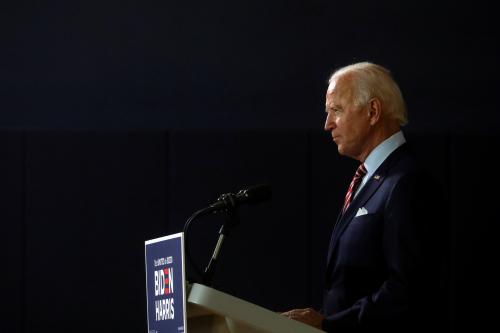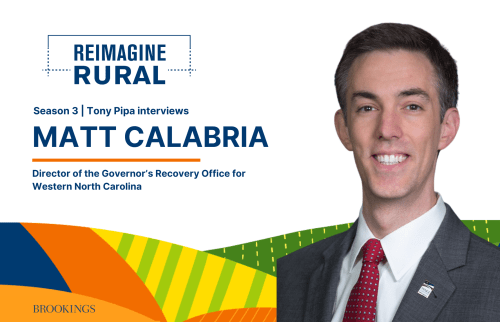Fannie Mae and Freddie Mac (the government-sponsored enterprises, or GSEs) play a foundational role in the U.S. housing market, providing financing to lenders for nearly half of current U.S. mortgages by buying the mortgages from lenders and packaging and selling them to investors. This makes mortgages cheaper and more available across the country.
During the housing boom of the 2000s and the crash in 2008, the GSEs were woefully undercapitalized. They were rescued by the federal government and placed into conservatorship with strict oversight by their regulator the Federal Housing Finance Agency (FHFA). Subsequently, multiple proposals emerged to restructure or replace the GSEs to reduce their risk of failure and advance the public mission that is the basis for their public support. While administrative reform of the GSEs has been ongoing since conservatorship began, in the past year FHFA has hastened the process of releasing them from conservatorship.
Any changes to the GSEs’ structure or operation will determine how well they are able to serve their public mission. These changes are taking place in the context of the current COVID crisis, a long lasting and broad affordable housing crisis, and a national reckoning on historic and ongoing racial discrimination. As discussed in this paper, several essential steps are necessary for the GSEs to best serve their important role.
Conservatorship has created an historic opportunity for addressing the nation’s affordable housing crisis and advancing racial equity in housing. As part of the assistance plan for the GSEs, the government received stock interests in the GSEs, now valued at $48 to $98 billion by the Congressional Budget Office. The value of these assets comes from fees collected from GSE loans and that value should remain in the housing market to further affordable housing. In particular, the government’s stock interests in the GSEs should be exchanged for a comparable commitment by the GSEs of additional affordable housing measures and a restorative justice housing program that provides targeted down payment and other assistance aimed at closing the racial homeownership gap.
While most home values and equity rebounded from the 2008 recession and withstood the COVID crisis, many families have struggled, particularly lower wealth families and families of color. A widespread affordable housing crisis limited opportunities for many across the country going into the COVID crisis, with homeownership far below pre-housing boom levels and more than 20 million families struggling with unaffordable rent. Conditions worsened in 2020.
A primary statutory purpose of the GSEs is to advance affordable housing. While the GSEs have maintained their affordable housing programs in recent years, conservatorship has constrained these activities. The GSEs have operated with limited capital at a time when the country needed substantially increased focus on and support of affordable housing from the GSEs. Now they must greatly increase their work to meet the country’s pressing affordable housing needs.
The past year has also seen a national reckoning on the history and continuation of racial discrimination, exclusion, and segregation in our country. Systemic racial barriers exist in all facets of American life, including policing, healthcare, and housing. The housing market profoundly manifests these barriers, including in the huge gap between white homeownership, at 72%, and Black and Latino homeownership, at 42% and 48% respectively. This disparity is as great as that existing before the passage of the Fair Housing Act in 1968 and even going back to the 1890s. For the GSEs, only a small percentage of their home purchase loans have gone to Black and Latino homebuyers in recent years, with less than 5% of their loans made to Black families in 2019. The GSEs’ charters include a duty to advance fair lending and equity, and much more has to be done by them to advance that national responsibility.
The success of the GSEs in conservatorship – in which they have operated as de facto utilities and stabilized the housing market following the 2008 housing crash – establishes that utility oversight is the best structure for the GSEs going forward. During the COVID public health and economic crisis, a utility structure has enabled the GSEs to provide critical relief to the housing market and the overall economy – assistance that was possible only due to the GSEs’ special status, their substantial resources, and the enhanced oversight authority granted to FHFA under conservatorship. A utility structure should be implemented permanently in order to secure the GSEs as an emergency backstop during a crisis, enhance operation of the GSEs in regular times, and advance the GSEs’ public mission.
Increased affordable housing support, racial equity programs, and utility oversight should be solidified and formalized during conservatorship while the GSEs build up capital. It is critical for these reforms to be implemented before release of the GSEs occurs. While GSE reform can be implemented legislatively or by administrative action, enacting GSE legislation has proven difficult. Thus, continuing administrative reform is more likely. Central to the reform process is resolution of the GSEs’ obligations for the aid it received following the 2008 crisis and the ongoing backup support the government will continue to provide in the future. Any amendments to the documents governing these issues will lock in the terms of the GSEs’ operation and obligations going forward and will be difficult to change. Thus, bolstered affordable housing and racial equity measures and utility oversight must be baked into these steps.
Click here to download the full report.
Michael Calhoun is president of the Center for Responsible Lending. Lewis Ranieri is chairman and CEO of Ranieri Solutions LLC; co-chairman for the National Association of Home Builders Mortgage Roundtable since 1989; and board member of SolomonEdwards Group, Inc. since 2018. Other than the aforementioned, the authors did not receive financial support from any firm or person for this article or from any firm or person with a financial or political interest in this article. Other than the aforementioned, they are currently not an officer, director, or board member of any organization with an interest in this article.
-
Acknowledgements and disclosures
The authors acknowledge the contributions of Mark Goldhaber, Nikitra Bailey, Melissa Stegman, and Eric Stein.
The Brookings Institution is committed to quality, independence, and impact.
We are supported by a diverse array of funders. In line with our values and policies, each Brookings publication represents the sole views of its author(s).









